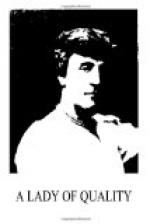But though, two years before, the entire county would have rated low indeed the wit and foresight of the man who had even hinted the possibility of such honour and good fortune being in prospect for the young lady, so great was Mistress Clorinda’s brilliant and noble beauty, and with such majesty she bore herself in these times, that there were even those who doubted whether she would think my lord a rich enough prize for her, and if, when he fell upon his knees, she would deign to become his countess, feeling that she had such splendid wares to dispose of as might be bartered for a duke, when she went to town and to court.
During the length of more than one man’s lifetime after, the reign of Mistress Clorinda Wildairs was a memory recalled over the bottle at the dining-table among men, some of whom had but heard their fathers vaunt her beauties. It seemed as if in her person there was not a single flaw, or indeed a charm, which had not reached the highest point of beauty. For shape she might have vied with young Diana, mounted side by side with her upon a pedestal; her raven locks were of a length and luxuriance to clothe her as a garment, her great eye commanded and flashed as Juno’s might have done in the goddess’s divinest moments of lovely pride, and though it was said none ever saw it languish, each man who adored her was maddened by the secret belief that Venus’ self could not so melt in love as she if she would stoop to loving—as each one prayed she might—himself. Her hands and feet, her neck, the slimness of her waist, her mantling crimson and ivory white, her little ear, her scarlet lip, the pearls between them and her long white throat, were perfection each and all, and catalogued with oaths of rapture.
“She hath such beauties,” one admirer said, “that a man must toast them all and cannot drink to her as to a single woman. And she hath so many that to slight none her servant must go from the table reeling.”
There was but one thing connected with her which was not a weapon to her hand, and this was, that she was not a fortune. Sir Jeoffry had drunk and rioted until he had but little left. He had cut his timber and let his estate go to rack, having, indeed, no money to keep it up. The great Hall, which had once been a fine old place, was almost a ruin. Its carved oak and noble rooms and galleries were all of its past splendours that remained. All had been sold that could be sold, and all the outcome had been spent. The county, indeed, wondered where Mistress Clorinda’s fine clothes came from, and knew full well why she was not taken to court to kneel to the Queen. That she was waiting for this to make her match, the envious were quite sure, and did not hesitate to whisper pretty loudly.
The name of one man of rank and fortune after another was spoken of as that of a suitor to her hand, but in some way it was discovered that she refused them all. It was also known that they continued to worship her, and that at any moment she could call even the best among them back. It seemed that, while all the men were enamoured of her, there was not one who could cure himself of his passion, however hopeless it might be.




